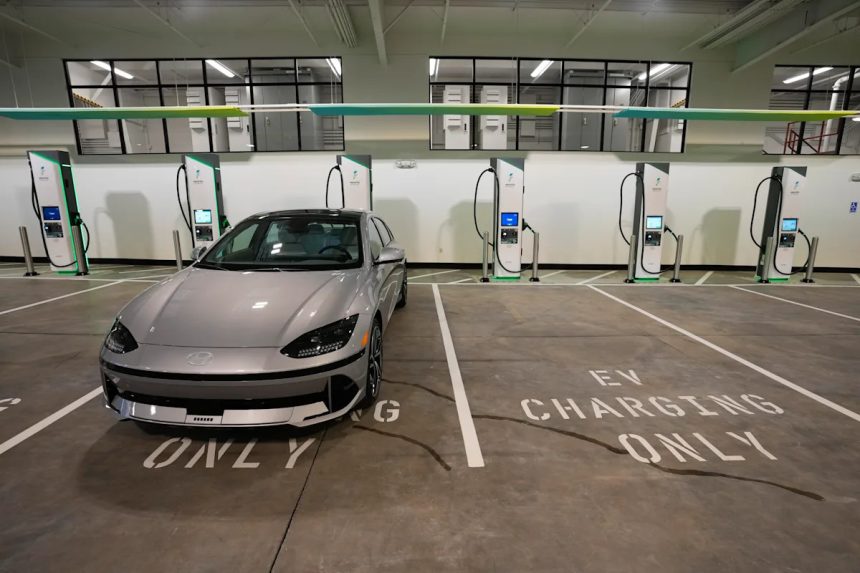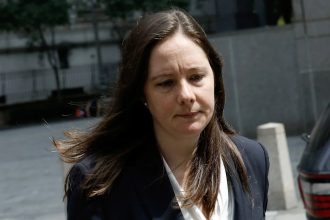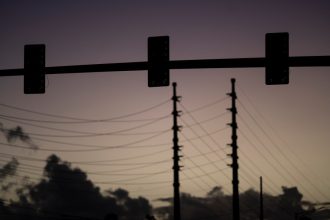California drivers don’t want to lose their electric vehicle tax incentives, but even voters in one of the bluest states are wary about reviving plans to phase out gas cars.
Voters are split down the middle on whether California should stick to its guns on its Trump-blocked plans to phase out sales of gas cars by 2035, according to an exclusive POLITICO-Citrin Center-Possibility Lab poll. Only 46 percent of the more than 1,400 registered voters surveyed said they support the policy, while 47 percent said no.
Yes, there was an obvious partisan split: 60 percent of Democrats said they backed the phase-out, compared with 40 percent of independents and 31 percent of Republicans.
But the results offer a note of caution for Gov. Gavin Newsom, who directed the California Air Resources Board to start writing new vehicle emissions rules after Republicans revoked the state’s sales mandates for cars and heavy-duty trucks in June.
“None of us really like the idea of government intervening to take something away from us,” said Dan Sperling, a former California Air Resources Board member and director of the University of California, Davis’ Institute for Transportation Studies. “That’s even the most liberal of us.”
Poll respondents are more bought into Newsom’s plan to backfill the soon-to-be-defunct $7,500 federal EV tax credit.
Nearly two-thirds — 64 percent — said they would support state-funded tax incentives once the federal subsidy ends Sept. 30, as part of the Trump administration’s ongoing attacks on clean energy policy.
That question again showed a partisan divide, with 80 percent of Democrats saying they back the approach, compared with 60 percent of independent voters and just 43 percent of Republicans. But the overall result bolsters Newsom’s push to backfill incentives that the Biden administration used to coax drivers off fossil fuels, as he suggested using cap-and-trade revenues last year and directed state agencies to consider in a June executive order.
But Jack Citrin, a veteran political science professor at UC Berkeley and partner on the poll, said a closer look at the poll results shows that Democrats need to keep affordability in mind. He pointed to the fact that 28 percent of respondents said they’d support new EV incentives only if gas prices aren’t impacted and another 20 percent said they should be reserved for low-income buyers, reflecting the fact that cost of living was the top concern of voters polled. And 64 percent of respondents said gasoline prices are putting a significant, extreme or moderate burden on their household budgets.
“That reflects a concern with the cost of all of this,” Citrin said. “Yes, we’re for environmental protection. Yes, we’re for all of this, just as long as it doesn’t cost a lot.”
The poll comes as state agencies released a joint report Tuesday with recommendations for countering Trump’s assault, calling on lawmakers to bolster tax incentives, improve charging infrastructure and regulate facilities that attract polluting trucks, but offering few specific timelines or dollar figures.
CARB Chair Liane Randolph framed the report — which Newsom asked for in his June order — as a first step in the state’s defense against a hostile federal government.
“Clean air efforts are under siege, putting the health of every American at risk,” she said during a press briefing. “California is continuing to fight back and will not give up on cleaner air and better public health.”
Sperling called the report a surprisingly “modest document,” and said it lacks the specificity he hoped to see.
“The word I would use is disconcerting,” Sperling said when asked about where California stands in its fight against Trump.
The POLITICO-Citrin Center-Possibility Lab poll was fielded by TrueDot, the artificial intelligence-accelerated research platform, in collaboration with the Citrin Center and Possibility Lab at UC Berkeley and POLITICO. The public opinion study, made possible in part with support from the California Constitution Center, was conducted in the field between July 28 and Aug. 12.
The sample of 1,445 registered voters was selected at random by Verasight, with interviews conducted in English and Spanish, and includes an oversample of Hispanic voters. The modeled error estimate for the full sample is plus or minus 2.6 percent. The policy influencer study was conducted from July 30 to Aug. 11, among 512 subscribers to POLITICO Pro, and the modeled error estimate is plus or minus 3.7 percent.
Like this content? Consider signing up for POLITICO’s California Climate newsletter.









